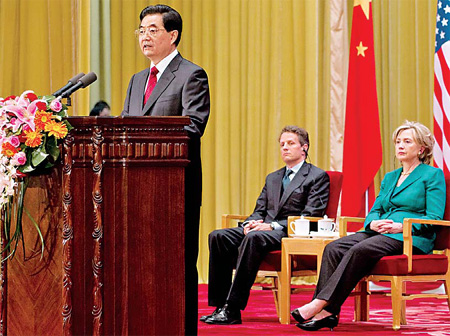News
China, US agree on 'prudent' stimulus exit
By Ding Qingfen and Wang Bo (China Daily)
Updated: 2010-05-25 07:16
 |
Large Medium Small |
|
 President Hu Jintao speaks as US Secretary of State Hillary Clinton and US Treasury Secretary Timothy Geithner listen during the opening session of the second round of the China-US Strategic and Economic Dialogue in Beijing, Monday, May 24, 2010.[Saul Loeb/Agence France-Presse] |
"Given the uncertainty embedded in the European sovereign debt crisis, the two countries agreed that the pace of retreat from stimulus should proceed in a steady manner," Zhang Xiaoqiang, vice-chairman of National Development and Reform Commission, the nation's top economic planner, told a press conference in Beijing.
He said the country's major economic tasks this year will be to spur domestic demand, stabilize price level, press ahead with economic restructuring and steadily develop an open economy.
"Due to the recent changes in the global and domestic economic landscape, it is necessary for the two countries to continue to stimulate their economies and coordinate in withdrawing stimulus," said Zhang Xiaojing, senior economist with the Chinese Academy of Social Sciences.
He said Chinese authorities were now far less upbeat about the prospect of the country's economic growth than it was in the first quarter, due to fears on the spillover effect of the European crisis.
Premier Wen Jiabao said earlier this month that the Chinese economy continued to improve, but domestic and external conditions remained extremely complex, and macro adjustment faces much dilemma.
Huang Yiping, senior economist at Peking University, said it was necessary to be prudent in choosing the timing for economic stimulus policy withdrawal, due to concerns over a second dip in the European economy.
He doubted whether China and US can "dance in the same tune" in the process of exiting from expansive policies, as the two countries are in different stages of the economic cycle.
The Chinese economy expanded at 11.9 percent in the first three months this year, accelerating from the 8.7 percent growth a year ago as the country was navigating the financial crisis, while the US economy, growing at 3.2 percent in the first quarter, has just ridden through the financial crisis.
Consumer inflation in China also grew to 2.8 percent in April, the highest in 18 months, while the rise of housing prices showed little sign of easing, giving further evidence that the economy is overheating.
Huang said it was time for China to think about quitting its expansive macroeconomic policies, as food prices continue to climb and market liquidity remains ample.





